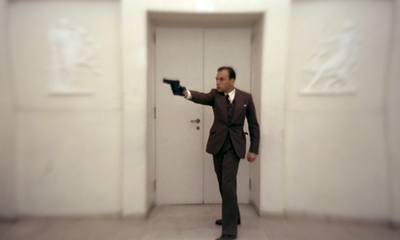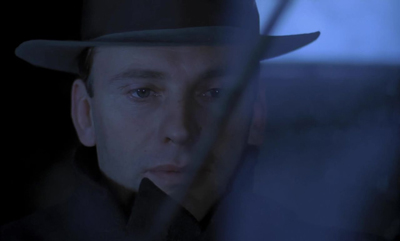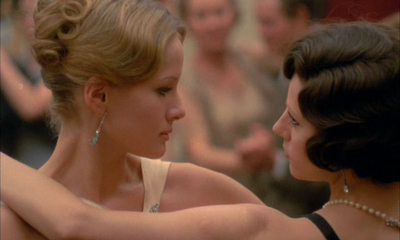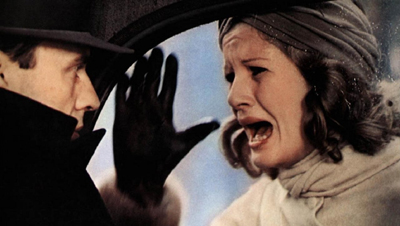
 |
|
|
|
Bernardo Bertolucci really wowed the college crowd with his The Conformist (1970), which at the time seemed to re-introduce color and high style into political filmmaking. Its intoxicating Vittorio Storaro visuals lent a nostalgic sheen to a corrupt world of the past. Bertolucci's grim character study relates politics to sexuality with a sophistication that eluded earlier "summer of '68" pro-revolution films. In America it played briefly in a few art theaters and thereafter seemed to exist only in a handful of tattered Technicolor prints -- and worse, in a dubbed English version. Paramount released a good DVD of this title in 2006, but in HD it is truly eye-popping. 1 
It's 1938, and Fascist Italy is still trying to silence leftist dissent, even abroad. Well-born Marcello Clerici (Jean-Louis Trintignant) is an agent for Mussolini's secret police eager to rise in the system. Like a good company man, he cultivates an acceptable Fascist 'image' to please his superiors. Marcello's best friend is Italo (José Quaglio), a blind radio personality who gives inspirational speeches about the grand future of Germany and Italy. Marcello becomes engaged to Giulia (Stefania Sandrelli), who has no interest in political matters. He goes to confession to prepare for the wedding, and recalls killing a chauffeur (Pierre Clémenti) who tried to molest him when he was a child. Marcello is given an important assignment to be carried out on his honeymoon in Paris: assassinate the anti-Fascist philosopher Quadri (Enzo Tarascio), his college mentor sent into exile years before. The mission is complicated by Quadri's young wife Anna (Dominique Sanda), a woman that excites Marcello far more than his own new bride. Can a movie look too good? If The Conformist has a flaw, it's that every shot is a visual delight that threatens to overwhelm the narrative. The stylish Ferdinando Scarfiotti interiors are like an Italian fashion magazine with a purpose; the sight of Stefania Sandrelli dancing in a zig-zag dress in her mother's living room washes away three decades' worth of homogenized MGM art direction. The enormous marble interiors of the Fascist headquarters say more about the Mussolini era than saluting mobs ever could. The movie is heavily stylized without looking like a stunt or a special effect. 
Vittorio Storaro's camerawork was a major revelation in 1970. Light from Venetian blinds cuts up the warm Italian interiors; exterior shots use blazing sunsets and swirling leaves to nostalgic effect. Storaro's theories about the production of emotional states through color come into play in Paris, where selected scenes are filmed all in blue or red light. For anybody who has ever tried to make a film The Conformist is a humbling experience. We're frequently astonished by the control of color seen in large interiors. Nature seems to be cooperating when Bertolucci films in near-impossible locations, such as a cold and dark winter forest. Fresh from an acclaimed film for television (The Spider's Strategem), Bertolucci interprets a book by Alberto Moravia that addressed the nature of Fascism and the distortions of personality that it encourages. Marcello Clerici aspires to join an elite by behaving as obsequiously as possible. A Fascist superior observes that Marcello is motivated neither by greed nor fanaticism, and a priest in the confessional is impressed by Marcello's desire to become supremely 'normal.' For Marcello, normalcy is a stable home life to hide his secret career as a political assassin. Fascism can't abide intellectuals like Professor Quadri. It won't allow its own to be publicly human -- Marcello fits into the system by becoming a monster, at least part way. 
The film's tension derives from the realization that Marcello Clerici is more an opportunist than a Fascist. Incompatible emotions interfere when it comes time to finish his mission. He admires his prey and adores the man's wife. The henchman associate Manganiello (Gastone Moschin, "Don Fanucci" in The Godfather Part II) knows that Marcello is a fake. Clerici plays with a gun like a little boy, as if trying to convince himself that he's a killer. Weirdly, both Marcello and Manganiello serve only as spectators at the film's final ambush. The Conformist compares well to the work of other esteemed European directors. The picture has a lush look but sees no need to be epic in scope; the group dance scene with the tango is just as 'alive' as anything in a Visconti movie. Bertolucci also shows more restraint in this film than American Visconti admirers Coppola and Scorsese, who continually use his design and camera talent. The exotic visuals never seem like a series of empty special effects, and the final violence in the frozen woods proves that Less is More by avoiding overblown editorial fireworks. 
Jean-Louis Trintignant gives Marcello Clerici a vitality one wouldn't expect in such a mysterious, ambiguous character. Stefania Sandrelli (Seduced and Abandoned) and Dominque Sanda (The Garden of the Finzi-Continis) are beautifully contrasted. That section of the film manages some weirdly convincing sexual connections; we're led to think that Marcello is trying to make himself the center of a perfect three-way relationship. Bertolucci does verge on self-indulgence, at least once. The scene in which Clerici impresses Professor Quadri with a recitation of the riddle of Plato's Cave is a visual beauty, especially with Vittorio Storaro's shadow games at work. It's only when it is over that we realize that the Plato lesson is too basic to serve as advanced-level philosophy. When Quadri opens the window and banishes Clerici's "Fascistic" shadow ... it's all a bit too pat. That's an A-minus moment in a movie made of A-plus scenes. 
The Rarovideo - Kino Lorber Blu-ray of The Conformist is a new restoration overseen by its director and cinematographer. Colors are solid and rich, and not too saturated. The inventive, evocative score is by Georges Delerue.The two video extras are a beat-up American trailer (too reminiscent of my first time watching the film) and a very thorough documentary by Adriano Aprá, In the Shade of the Conformist. The 57-minute show begins with an overview of Bernardo Bertolucci's career and then sets him loose to describe every aspect of the making of the film.
Aprá twice interrupts the director to offer graphs and charts breaking The Conformist down in terms of shot length, static shots versus moving shots, etc., and then compares that data to Bertolucci's other films and films by other directors of the time. It reminds me of the critical studies department at UCLA, where the critical effort
For once the label has a film that fully justifies its lengthy text excerpts. Liner notes identify some of the main locations for the film. Included is a lengthy essay by Emiliano Morreale, a statement by Bernardo Bertolucci from 1971 and various quotes from critics, often comparing the film to Moravia's novel. It then includes similar quote-statements from the film's stars and technical talent, all of which clearly feel it's among their best work. Designer Fernandino Scarfiotti reminds us that the massive architecture in Mussolini's buildings is exaggerated to better reflect the feeling of the era. Vittorio Storaro based his color choices on the idea that the main character, a former victim of child abuse, wanted to hide himself within the identity of Fascism. He also puts up a good defense of the film's Plato's Cave allegory: both he and Bertolucci see it as descriptive of cinema itself.
On a scale of Excellent, Good, Fair, and Poor,
The Conformist Blu-ray rates:
Footnote: 1. More info on the American release from helpful long-time correspondent "B.B.", 11.14.14: Dear Glenn: "In America it played briefly in a few art theaters..." It played a while in a number of the country's better art houses in 1971. "Briefly" suggests one and done; The Conformist played for weeks. The original IB Technicolor prints were gorgeous. The main problem later on had to do with Par's original plan to promote a dubbed version of the film -- which was desired by no one. I don't recall any '71 playdates for the English-track version. So the original subtitled 35mm prints played constantly in revival houses until they either became "tattered," as you say, or perhaps missing. The way the story goes, Paramount was loath to strike a new subtitled print of the movie at least in part because the studio had a number of practically unused English-language prints on hand. These were not beloved in repertory houses. [Impressed by the way the film had turned out, Par reportedly spent a bit more than usual on the English dub and had hoped to get some general release bookings for the movie. Well, the English-dubbed version is quite aurally elaborate, but it isn't notably successful as drama.] It became difficult to see The Conformist properly in 35mm in America for many years; almost impossible in the west, fairly rare in the east. Worse, when Paramount initially brought out the movie on videocassette and laserdisc in the early '80s, the studio released the English-dubbed version. The studio theatrically reissued the film in art houses in the mid-'90s, striking new 35mm prints of the film after Vittorio Storaro supervised a restoration of the movie; these prints finally included a brief scene cut from the picture's original release. In 2006, Par finally issued the film on dvd. "Bertolucci also shows more restraint in this film than American Visconti admirers Coppola and Scorsese, who continually use his design and camera talent." I think Coppola and Scorsese both admire Visconti and have absorbed his work, but I think they are both probably more directly influenced by Bertolucci. You're right about the restraint (for the most part), but the influence of The Conformist on both The Godfather and, particularly, The Godfather Part II is almost beyond measure. The Bertolucci film must have been like a master class for Coppola. He learned an astonishing amount from The Conformist. Incidentally, I don't believe in the ending of this movie. It's just a shaggy dog story. I simply don't buy it; it has me going for nearly two hours, but I can't accept the conclusion. It's just too empty. Still, it's a great ride.
Fine piece. Best, Always. -- B.

Reviews on the Savant main site have additional credits information and are often updated and annotated with reader input and graphics. T'was Ever Thus.
Review Staff | About DVD Talk | Newsletter Subscribe | Join DVD Talk Forum |
| ||||||||||||||||||